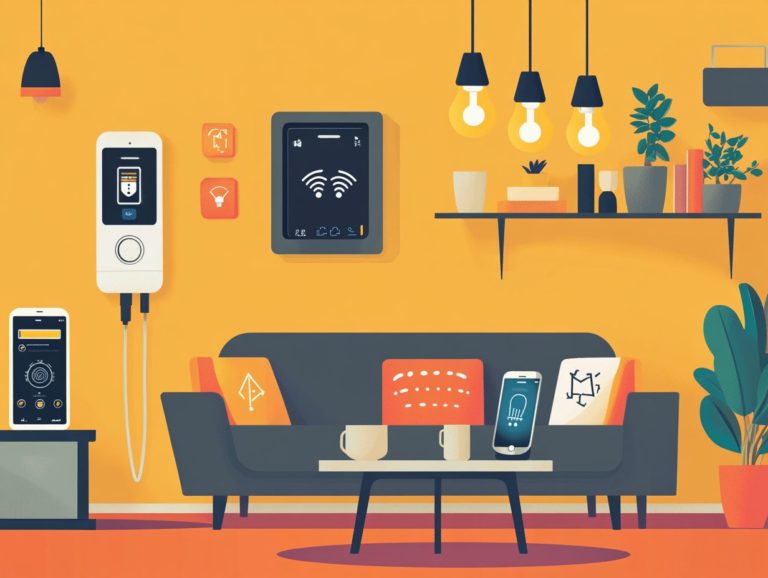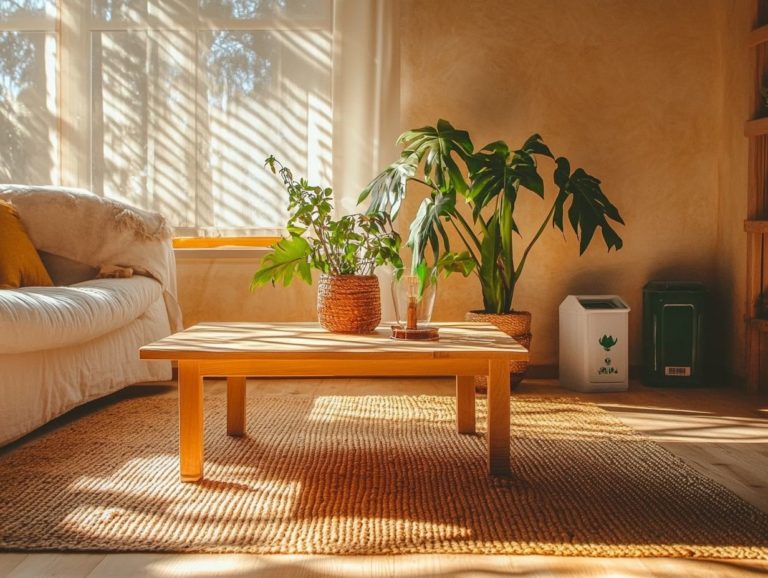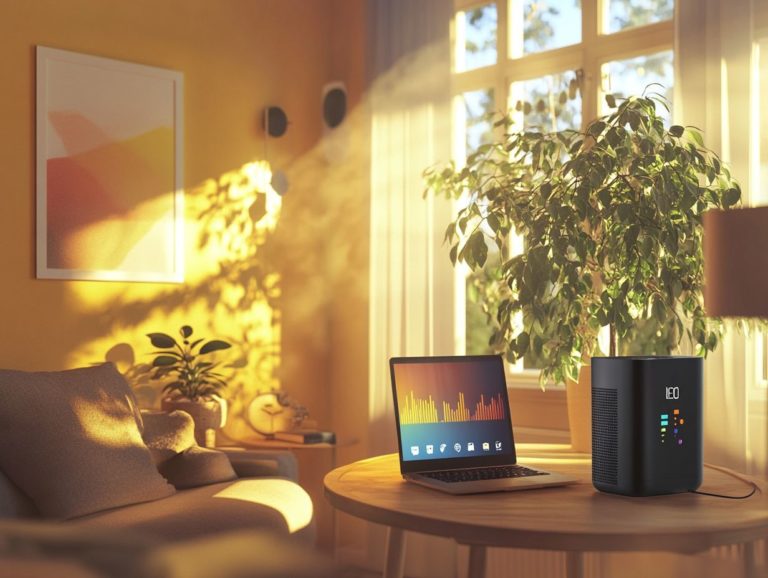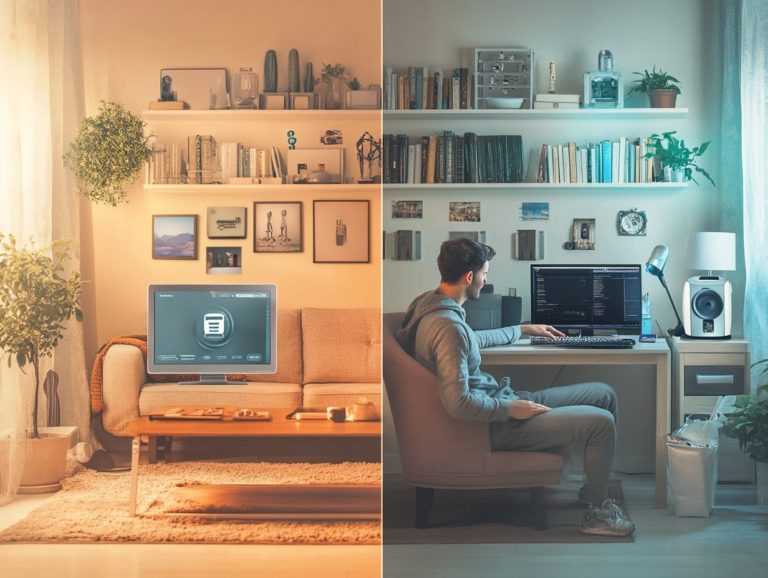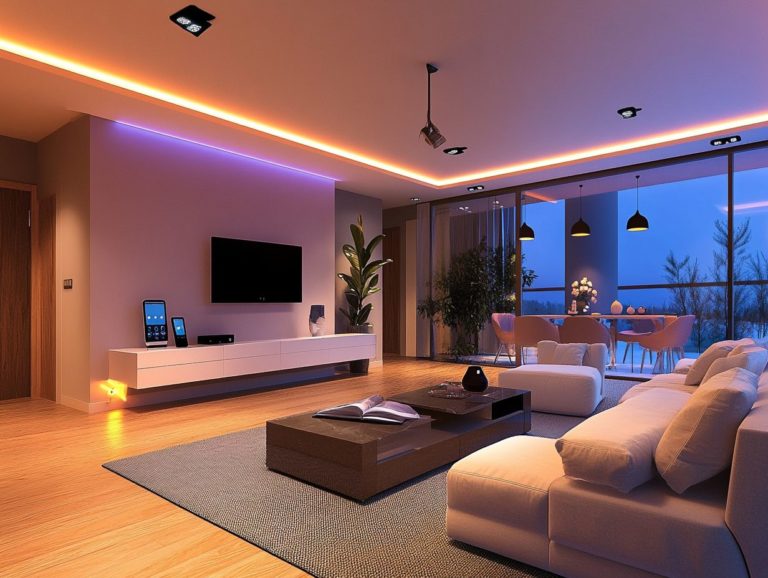How to Create a Smart Energy-Efficient Home
In today s world, embracing energy efficiency is essential for responsible living. It not only brings significant cost savings but also provides a meaningful opportunity to reduce the amount of greenhouse gases you produce and embrace sustainable living.
This guide delves into the concept of energy efficiency and highlights its numerous benefits, especially in crafting a smart home that utilizes smart devices and smart lighting.
You ll discover how to evaluate your current energy consumption, pinpoint areas ripe for improvement, and adopt actionable strategies to implement energy-saving habits and technologies, including smart appliances and smart energy solutions.
Embark on this journey to transform your home into a smarter, more sustainable space!
Contents
- Key Takeaways:
- Understanding Energy Efficiency
- The Benefits of Creating a Smart Energy-Efficient Home
- Assessing Your Home’s Energy Usage
- Steps to Creating a Smart Energy-Efficient Home
- Additional Tips for Maximizing Energy Efficiency
- Frequently Asked Questions
- Creating a Smart Home
- 1. What is a smart energy-efficient home?
- 2. How can I create a smart energy-efficient home?
- 3. What are the benefits of having a smart energy-efficient home?
- 4. Do I need to have technical knowledge to create a smart energy-efficient home?
- 5. What are some cost-effective ways to make my home more energy-efficient?
- 6. Can I still have a stylish and comfortable home while being energy-efficient?
Key Takeaways:
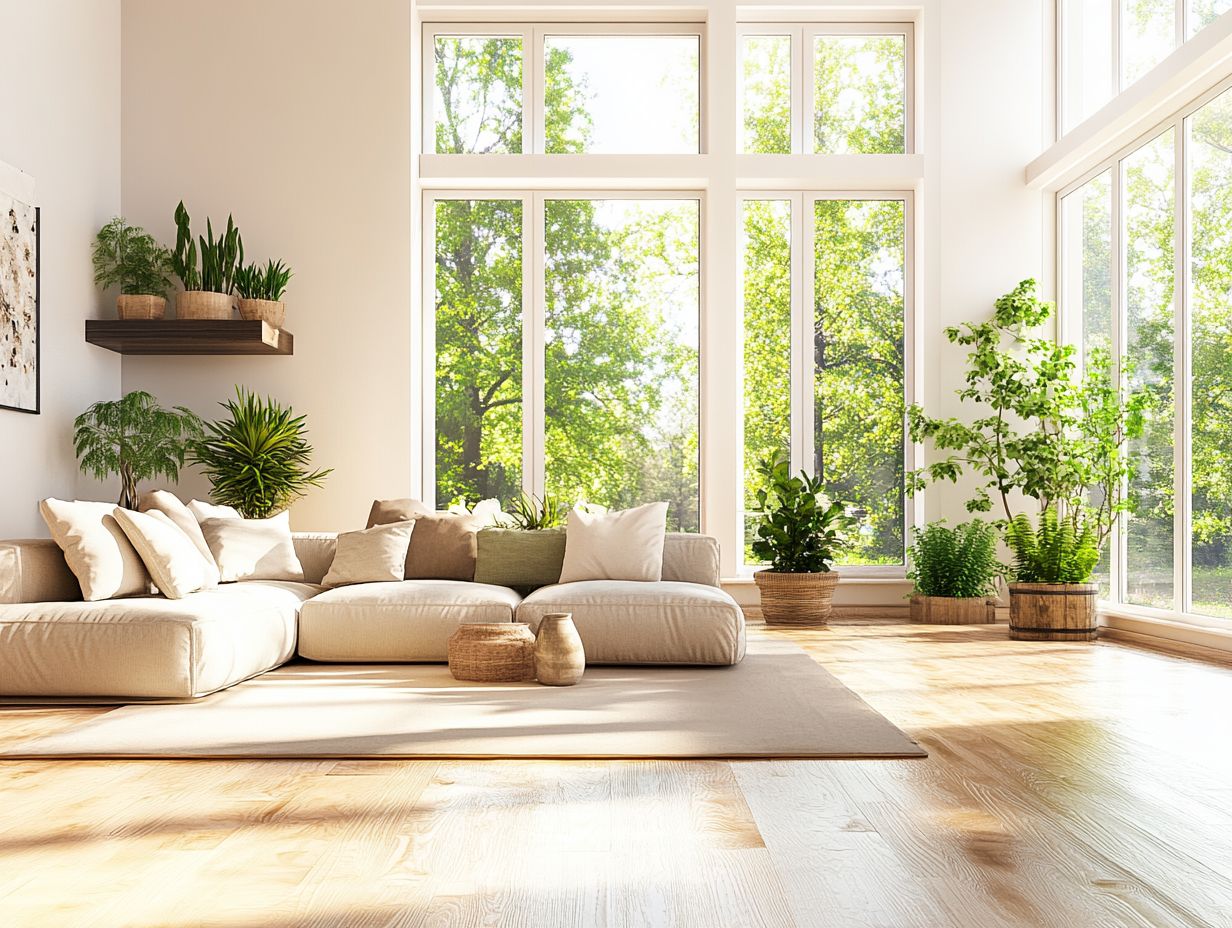
- Energy efficiency is the use of less energy to achieve the same level of performance, resulting in cost savings and a reduced environmental impact.
- Creating a smart energy-efficient home can lead to significant cost savings and help reduce your environmental footprint.
- Assessing your home’s energy usage and implementing energy-saving habits are crucial steps in creating a smart energy-efficient home.
Understanding Energy Efficiency
Understanding energy efficiency is vital for homeowners like you who want to cut energy consumption and lessen their carbon footprint while championing sustainable living. It s all about using less energy to achieve the same results whether that s heating, cooling, or lighting without compromising on comfort or functionality.
By adopting energy-efficient practices and technologies, such as smart devices and modern heating and cooling systems, you can not only boost your energy savings but also play a significant role in fostering a healthier environment. This paves the way for a more sustainable future.
What is Energy Efficiency?
Energy efficiency is all about leveraging technology and practices that allow you to consume less energy while still enjoying the same level of comfort in your home.
This concept minimizes energy waste and embraces a range of innovative solutions, like smart thermostats that enhance energy management and automatically adjust heating and cooling for peak performance. When you invest in energy-efficient systems, you ll likely notice a significant drop in your utility bills, all while enhancing your living environment.
For example, smart technology offers real-time monitoring of your energy consumption, enabling you to tweak your usage based on peak and off-peak hours. By utilizing these cutting-edge tools, you can take control of your energy usage, making informed choices that foster sustainability and help reduce your overall carbon footprint.
The Benefits of Creating a Smart Energy-Efficient Home
Creating a smart energy-efficient home brings a wealth of benefits that go well beyond just saving money. It fosters sustainability, elevates your comfort, and dramatically cuts down on energy consumption.
Smart devices and appliances designed for energy efficiency can optimize your energy usage, significantly reduce your utility bills, and play a positive role in environmental efforts to lower carbon footprints.
This comprehensive approach ensures that your home operates efficiently while also providing a healthier living environment through enhanced energy management.
Cost Savings and Environmental Impact
The adoption of energy-efficient systems in your home can lead to substantial cost savings on energy bills while also significantly reducing your environmental impact, contributing to a more sustainable future.
By dramatically lowering your energy consumption, these systems not only help you keep utility expenses in check but also align with broader environmental goals. You can benefit from various energy credits and tax incentives, making that initial investment feel much more manageable.
These technologies reduce reliance on fossil fuels, ultimately decreasing your overall carbon footprint. This transition to cleaner energy sources supports the ongoing shift toward sustainable living, nurturing healthier communities and preserving our planet for future generations.
Assessing Your Home’s Energy Usage
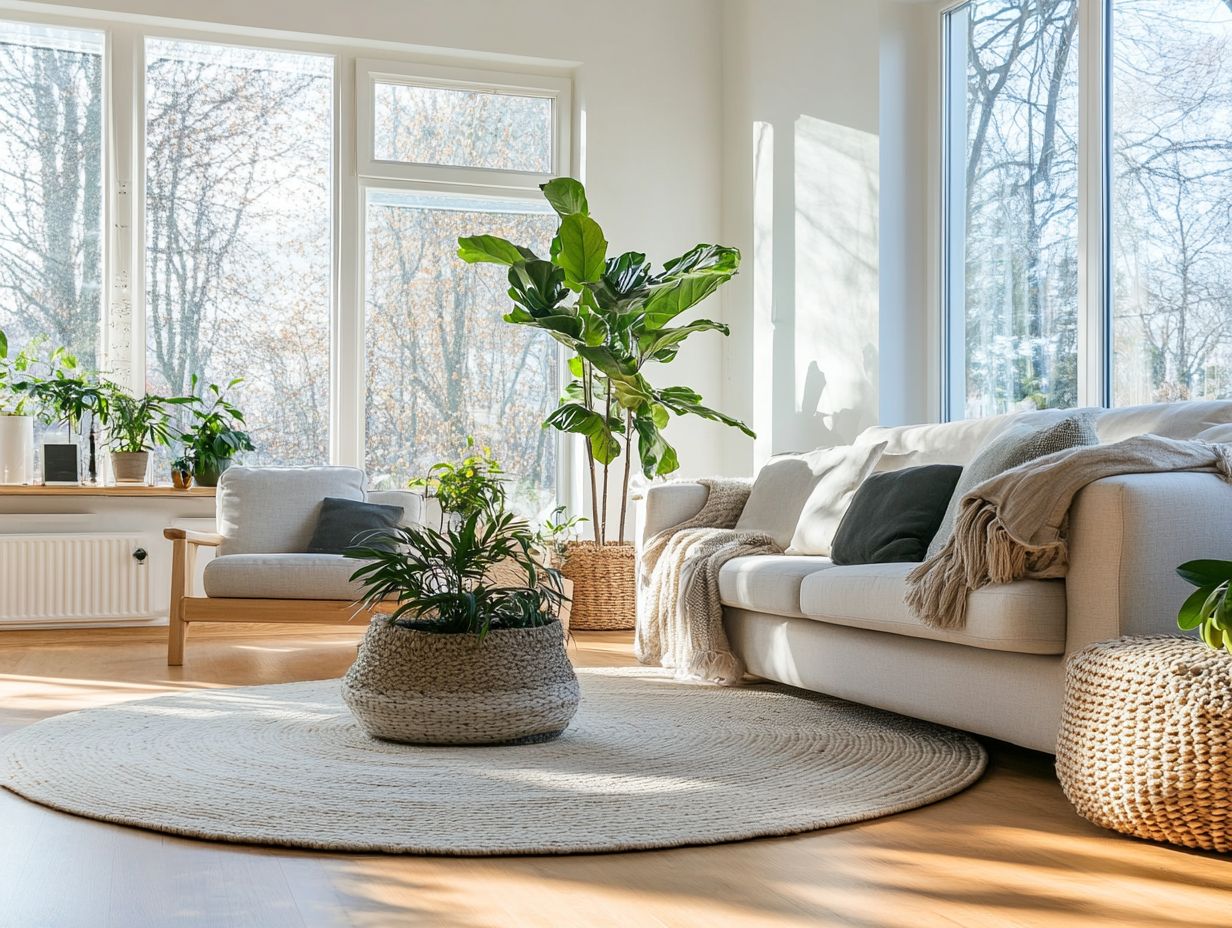
Assessing your home’s energy usage is an essential first step in enhancing energy efficiency and reducing consumption through smart devices and effective practices.
By leveraging energy monitoring tools and smart technology, you can gain valuable insights into your energy consumption patterns and uncover inefficiencies in your HVAC systems (heating, ventilation, and air conditioning systems).
This thorough analysis enables you to make smart changes today to save energy!
Identifying Areas for Improvement
Identifying areas for improvement in energy efficiency requires a thorough check of your home s systems and structures. Focus on things like insulation, air sealing, and integrating smart technology.
This journey starts with a meticulous assessment to pinpoint where heat loss sneaks in. Homeowners can examine attics, walls, and windows. Conducting energy audits checks to determine your home s energy use can help you uncover drafts and inadequate insulation.
Insulation maintains a comfortable indoor environment and curbs energy consumption. Effective air sealing keeps unwanted cold or warm air out. By incorporating smart technology, you can monitor your energy use in real time, simplifying the tracking of improvements over time.
Utilizing these tools enables you to craft a more efficient living space that elevates your comfort and trims down those energy bills.
Steps to Creating a Smart Energy-Efficient Home
Creating an energy-efficient home involves strategic steps that harness the power of smart devices and home automation. This approach elevates both your energy savings and overall comfort.
Integrating energy-efficient appliances, smart thermostats, and automated controls can drastically cut down on energy consumption while simplifying daily routines.
Embracing this connected technology enhances your living experience and promotes a sustainable lifestyle that benefits both the environment and your financial well-being.
Choosing Energy-Efficient Appliances and Systems
Choosing energy-efficient appliances and systems is essential for reducing energy consumption and maximizing the benefits of your smart home ecosystem.
By selecting ENERGY STAR-certified products, you play a vital role in protecting the environment while enjoying substantial savings on your utility bills. These certified appliances, like Smart Thermostats and Energy-Efficient Refrigerators, use advanced technology to optimize performance and minimize energy waste.
For example, a smart HVAC system learns your preferences and adjusts heating and cooling, keeping you comfortable while using less energy. Similarly, smart washers and dryers detect load sizes and tailor their cycles to use only necessary resources.
These innovations demonstrate how integrating ENERGY STAR-certified systems enhances convenience while actively promoting sustainability. Start shopping for ENERGY STAR products today!
Implementing Energy-Saving Habits
Implementing energy-saving habits is crucial for maximizing your smart devices’ performance and ensuring sustainable energy management in your home.
Transform your daily routines by adopting simple practices that align with advanced technology. For instance, use programmable timers to manage your lighting and appliances, optimizing usage and reducing energy wastage.
Combining these with occupancy detection features allows smart solutions to adjust settings based on room usage, leading to significant energy savings.
Integrating smart thermostats enables precise temperature control tailored to your schedule, enhancing overall efficiency. By prioritizing these energy-conscious habits, you contribute to a more eco-friendly living environment without sacrificing comfort.
Additional Tips for Maximizing Energy Efficiency

Maximizing energy efficiency is not just about installing energy-efficient systems; it s about weaving together renewable energy sources and advanced smart technology into a cohesive energy strategy.
By employing energy monitoring tools to analyze your consumption patterns and integrating solutions like solar panels and smart energy systems, you can significantly boost your energy savings while minimizing your environmental footprint.
This proactive approach creates a lively, sustainable home that benefits both you and the planet!
Utilizing Renewable Energy Sources
Utilizing renewable energy sources, such as solar panels, wind energy, and geothermal energy, is essential for anyone looking to create a sustainable and energy-efficient home.
These innovative energy solutions don t just help reduce your carbon footprint they can also lead to significant financial and energy savings over time. For example, solar panels capture sunlight and convert it into electricity, powering your daily appliances and resulting in lower utility bills.
While wind energy systems may be less common for residential use, they can still deliver considerable savings, especially in areas where the wind is abundant. Geothermal energy makes use of the stable temperatures underground, offering efficient heating and cooling options.
By investing in these clean energy solutions, you can reduce your reliance on fossil fuels, promote environmental well-being, and reap the benefits of long-term cost savings.
Incorporating Smart Home Technology
Incorporating smart home technology, including devices like Amazon Echo Dot and Google Nest, enables you to manage your energy consumption effectively through real-time monitoring and automated control.
This innovative approach allows you to track your energy usage patterns and pinpoint inefficiencies in your energy consumption during daily routines. By leveraging smart devices like thermostats, lighting systems, and appliances, you can seamlessly optimize your energy consumption. Additionally, learning how to choose energy-efficient appliances can further enhance your efforts without compromising on comfort.
Smart thermostats adjust heating and cooling based on occupancy detection, while automated lighting can dim or turn off in unoccupied rooms. Energy monitoring tools provide valuable insights into peak usage times, enabling you to shift energy-intensive activities to off-peak hours and maximize your savings.
Embracing these advancements not only leads to lower utility bills but also contributes positively to environmental sustainability.
Frequently Asked Questions
Creating a Smart Home
1. What is a smart energy-efficient home?
A smart energy-efficient home is a residence that utilizes technology and various energy-saving techniques to reduce energy consumption and lower utility costs. This can include smart appliances, energy-efficient lighting, and renewable energy sources.
2. How can I create a smart energy-efficient home?
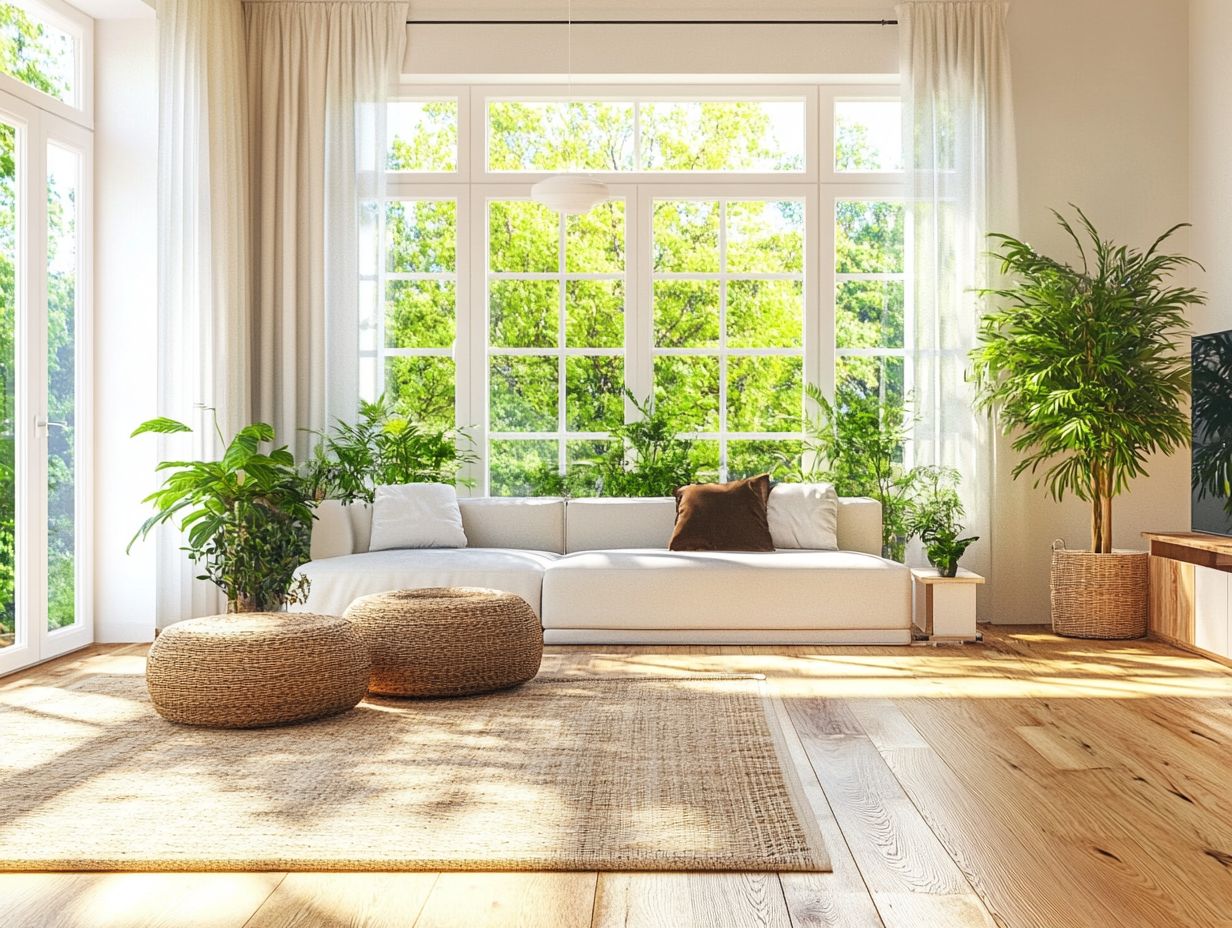
To create a smart energy-efficient home, you can start by conducting an energy audit to identify areas where energy can be saved. Install smart thermostats, LEDs, energy-efficient appliances, and smart home products.
You can also incorporate renewable energy sources like solar panels. Start your journey towards energy efficiency today!
3. What are the benefits of having a smart energy-efficient home?
A smart energy-efficient home saves you money on utility bills. It also reduces your environmental impact and enhances the comfort of your living space.
Plus, it can increase your home’s value and appeal to potential buyers.
4. Do I need to have technical knowledge to create a smart energy-efficient home?
No, you do not need technical knowledge to create a smart energy-efficient home. Most smart home devices are user-friendly. You can easily install and manage them using a smartphone app.
5. What are some cost-effective ways to make my home more energy-efficient?
Some cost-effective ways to improve energy efficiency include sealing air leaks and adding insulation. You can also use energy-efficient lighting and appliances.
Start today! Adjust your habits by turning off lights and unplugging devices when you’re not using them. Every little bit helps!
6. Can I still have a stylish and comfortable home while being energy-efficient?
You can absolutely have both style and comfort in a smart energy-efficient home! With the latest smart technology, enjoy a beautiful living space while saving energy!

